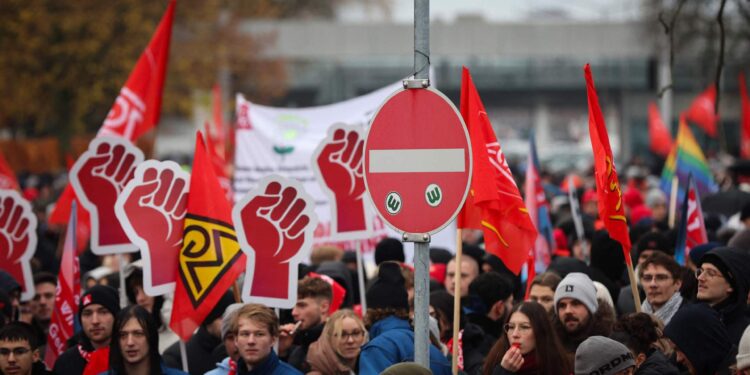The German trade union (IG Metall) said that Volkswagen workers will begin a warning strike tomorrow, Monday, at the company’s factories spread across Germany, in the first large-scale strike in the company’s local operations since 2018.
The strike represents a new escalation in the dispute between the largest car manufacturer in Europe and its workers over:
- Mass layoffs.
- Reducing wages
- Possible factory closures
These are strict measures that the company says it may have to take due to Chinese competition and declining consumer demand.
“If necessary, it will be the toughest collective bargaining battle Volkswagen has ever seen,” the union said today.
Bitter conversations
The giant automaker, which is suffering from a crisis, has been locked in bitter talks with unions since it announced in September that it was considering an unprecedented step of closing its factories in Germany, where it has about 120,000 employees.
On November 22, Volkswagen worker representatives voted in favor of implementing limited strikes at the company’s factories in Germany starting in December, after no progress was made in negotiations related to wages and the closure of factories.
“Volkswagen respects the right of employees to participate in the warning strike,” a company spokesman said in response to the workers union’s announcement, adding that the company had taken advance measures to ensure the continuation of essential supplies to customers and reduce the negative impact of the strike.
Warning strikes in Germany usually last a few hours.
Ahead of the talks last month, the union and Volkswagen works councils put forward a series of proposals that they said would save 1.5 billion euros ($1.6 billion) in labor costs without having to close the site. These proposals included eliminating bonuses.
The union also said it might abandon the demand for higher wages in exchange for working shorter hours in some factories.
But Volkswagen concluded that while the measures might help in the short term, they would not save the company in the longer term. The union expressed its regret over the company’s response and accused it of “ignoring the constructive proposals of employee representatives.”
The dispute between the two sides concerns the wages of workers in Volkswagen factories, where a special internal agreement applies. So far, the company has rejected any wage increase and is instead demanding a 10% salary cut due to…
Her difficult situation. The company also canceled the employment insurance that had been in place for decades.
The two sides are expected to hold the next round of wage negotiations on the ninth of this month.



